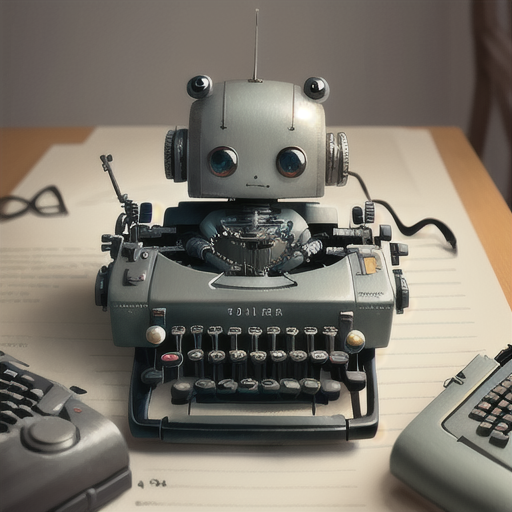
The BookFest Spring 2023 topic I was most excited for this weekend was the panel discussion of the impact AI has on reading and writing, and the event did not disappoint! The lively discussion was off to a fiery start when, after the author introductions, the moderator revealed she had secretly used AI to obtain the guests’ bios and then asked them if they were accurate. According to the guests, all the information was correct but that was the last thing they agreed on.
Aside from the moderator, the panel consisted of USA Today bestselling author, publisher, and founder of Wannabe Press Russell Nohelty and “The Tech Cat” Lori H. Schwartz, an author and technology entrepreneur. There was no meeting of the minds on the topic of AI at the conference today from either the guests or chat participants, reflecting the seriousness of the hot button issue in the recent months following the release of ChatGPT and the race for technology and internet companies to outpace each other.
So much was covered, so to give a flavor of the issues, I will break today’s conference debate down into bullet points from the tech side and publishing side.
Tech Side by Lori H. Schwartz:
- AI is a very smart search engine that will solve tasks in an economical way.
- AI is a misnomer because no original thinking, at least right now.
- ChatGTP allows you to review it, check it, and fix errors, just as with photo images. “Human element must continually partner with AI.” It defies the sci-fi trope because we are still in charge.
- Bad actors existed before AI and people have abused every technology that has ever come out. The solution is to develop rules. Use human ingenuity with AI tools to develop solutions.
- Humans think and write in bursts (creativity), but AI doesn’t, therefore ChatGTP can’t replace humans place in the creative world.
- Ultimately, AI could blow up and kill the planet, but there are the potential for interesting innovations leveraged in a positive way.
- Sometimes the government can’t keep up with technology, but who’s responsible for regulation? She suggests the government, parents, and tech company are all responsible for developing and enforcing regulations.
- She says that you can’t put the genie back in the bottle and the solution is to set up regulations to address the issues and people like fellow panelist and publisher Russell Nohelty should do it.
- She says that pushing back against ethical and infringement concerns will create change, but again suggests that since it’s the artists and writers whose intellectual property is at risk, it’s on them to fix it.
- What if AI evolves the art and publishing industries instead of destroying it?
Publishing Side by Russell Nohelty:
- AI is predictive, not thinking.
- He fears that because people in general are “lazy,” if people rely on AI, it requires a diligence that no one has demonstrated ever on a mass level.
- Example, a couple days ago “should you boil a baby?” was accidentally posted to ChatGTP and it answered yes. The question was mistyped and supposed to be “should you boil a baby’s bottle?”
- ChatGTP is only about 80 percent accurate and the longer a piece is, the less accurate ait tends to be. People generally won’t “check” the accuracy.
- Info may come from dubious sources, even sources widely known as dubious. He doesn’t like to have to automatically distrust and verify everything.
- AI data compilations where AI tells us what the truth is, is a dystopian nightmare.
- Too much potential for bad actors.
- AI can be good for audiobooks because it allows a better option than text-to-speech and is a low-cost production option for audiobooks.
- How do we come up with better solutions when regulations have always lagged behind technology?
- The biggest regulatory nightmares are for art and writing, otherwise he believes intense regulations should be developed internally at tech companies. Further, the customer has become a free beta tester (instead of relying on internal paid employees) and there are issues with intellectual property infringement. However, waivers from artists and writers would make a huge difference in ethics. Writers and artists need better “guard rails” for getting paid for their work.
- He believes that if you had no input on your creation such as with ChatGPT, and then submit it to an editor with your name on it, that is ethically wrong.
- It causes the publishing industry problems because authors using ChatGTP are submitting work in bulk since it’s fast but only mediocre.
- Ethics questions include whether you should declare to your editor or publisher that you generated it and the ethics of putting a ChatGTP created story into an anthology. Bottom line, the path forward can’t destroy the art and writing industries.
The discussion brings up both concerning and hopeful applications for the use of AI, but the point that ignited a pushback from me was Schwartz’s suggestion that it’s up to the artists and writers to fix the technology’s ethical issues. Posting in the real-time chat, I said, “I don’t think Tech companies should put it on the artists and writers to push for the regulations to protect their intellectual property.” I was more than a little surprised that, with the heated discussion going on in the chat box, not one person responded to my assertion.
Would you read something created by Chat GTP?